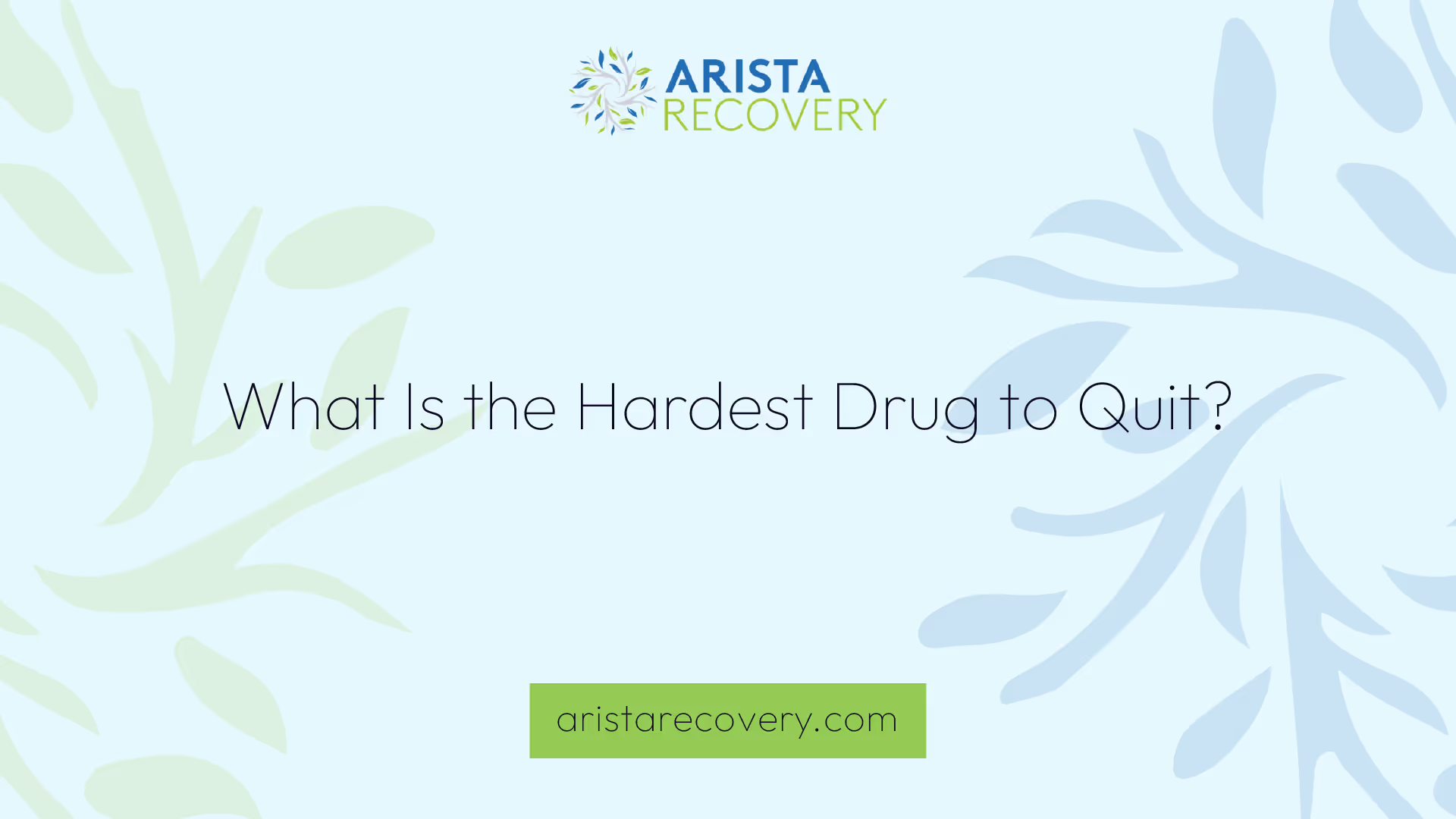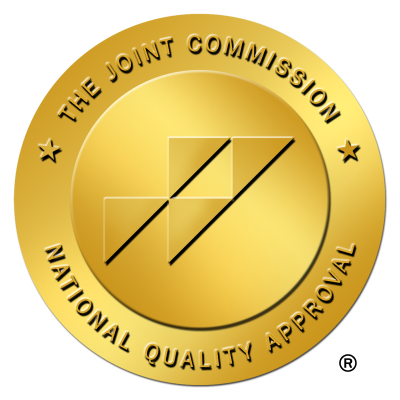What Is the Hardest Drug to Quit?

Understanding Addiction
Addiction is a complex and often misunderstood condition. It's not simply a matter of willpower or moral failing, but a disease that affects the brain and its functions. Understanding how drugs impact the brain can provide insight into why some substances are so challenging to quit.

Impact of Drugs on the Brain
Drugs have the ability to change the brain in ways that make quitting hard, even for those who want to. These changes challenge an addicted person’s self-control and interfere with their ability to resist intense urges to take drugs [1].
One of the primary ways drugs impact the brain is through the "reward circuit." This system is responsible for producing feelings of pleasure in response to certain activities. Most drugs affect this reward circuit, causing euphoria and flooding it with the chemical messenger dopamine. This leads to reinforcement of pleasurable but unhealthy behaviors like taking drugs.
Drugs can affect the brain's reward system more powerfully than other activities, making it harder to enjoy healthy activities and potentially leading individuals to feel the need to use drugs to feel good or okay. The withdrawal symptoms from drug cessation can range from negative emotions to life-threatening emergencies.
Neuroadaptations and Brain Function
Long-term drug use leads to changes in the brain's chemical systems and circuits. These changes affect functions such as judgment, decision-making, learning, memory, and behavior control. These factors contribute to the difficulty of quitting drugs and the tendency for relapse even after periods of abstinence [1].
Repeated drug use can create strong connections between drugs and associated cues, known as triggers. Triggers can include people, places, things, and feelings that remind individuals of using drugs and can intensify the desire to use them again. Avoiding these triggers can be challenging, and exposure to them can lead to a relapse.
In conclusion, understanding the impact of drugs on the brain and the neuroadaptations that occur with drug use is crucial in understanding addiction. This knowledge can help individuals and families affected by substance abuse better comprehend the challenges faced by those trying to quit drugs and provide insight into why some drugs are notoriously difficult to quit.
Factors Influencing Addiction
The journey from substance use to addiction is not linear or inevitable. Several factors contribute to the progression of substance use into a disorder. These include genetic makeup, environmental influences, and psychological factors.
Genetic and Environmental Factors
Genetic makeup plays a significant role in determining an individual's risk of developing a substance use disorder. It's estimated that genetics account for about half of a person's likelihood to struggle with addiction. However, genes are not destiny. Environmental factors can either exacerbate or mitigate genetic vulnerabilities.
Environmental factors that influence addiction include stress, family dynamics, and access to social support. For instance, individuals who grow up in unstable households or who lack a strong support network may be more likely to resort to substance use as a coping mechanism.
Additionally, gender can also influence addiction patterns. Men tend to drink more than women and are at a higher risk for alcohol use disorder. Conversely, women who use cocaine, opioids, or alcohol may progress from initial use to a disorder at a faster rate than men. Women also exhibit greater symptoms of withdrawal from some drugs and report worse negative effects during withdrawal [3].
Psychological Influences
Psychological factors can greatly impact the likelihood of developing a substance use disorder. For example, individuals with mental health disorders such as depression or anxiety may use drugs or alcohol to self-medicate, putting them at a higher risk of addiction.
Moreover, the way different substances affect the brain and behavior varies. For example, opioids lead to euphoria, drowsiness, and slowed breathing, while stimulants increase dopamine levels, causing a user to feel energized.
Progressive changes, known as neuroadaptations, occur in the structure and function of the brain as individuals continue to misuse substances. These changes compromise brain function and drive the transition from controlled, occasional substance use to chronic misuse, which can be difficult to control. More than 60 percent of people treated for a substance use disorder experience relapse within the first year after treatment [3].
In conclusion, understanding the risk factors for addiction can help in the development of effective prevention and treatment strategies. Recognizing these factors can also help individuals and families better understand the complexities of addiction, which is the first step towards recovery.
Hardest Drugs to Quit
When discussing substance abuse, it's crucial to understand that some substances are harder to quit than others. This difficulty is often due to the severe withdrawal symptoms that accompany cessation. In this section, we delve into some of the substances that are often considered the hardest to quit, including Heroin, Cocaine, Methamphetamine, and Benzodiazepines.
Heroin and Opioids
Heroin, a type of opioid, is frequently cited as one of the most challenging drugs to quit. It was involved in nearly 20% of all drug overdose deaths in 2019, illustrating its lethal potential [4].
Withdrawal symptoms from methadone, a medication used to help individuals quit heroin, include anxiety, restlessness, and flu-like symptoms. These symptoms can persist for several weeks, making the recovery process particularly difficult for those struggling with heroin addiction.
Cocaine and Stimulants
Cocaine, and particularly crack cocaine, is notoriously hard to quit due to its strong psychological dependence. Withdrawal symptoms such as anxiety and intense cravings can persist for months or even years, highlighting the long-term hold this substance can have on individuals [4].
Methamphetamine and Benzodiazepines
Methamphetamine, particularly in its potent form, crystal meth, is highly addictive. An estimated 2.5 million Americans used some form of illicit methamphetamine in 2020, indicating the widespread nature of this problem. The withdrawal process from methamphetamine is characterized by several stages, making it one of the hardest drugs to quit.
Benzodiazepines, such as Valium and Xanax, are highly addictive sedatives that can lead to drug dependence even when used as directed. Withdrawal from benzos can result in insomnia, anxiety, muscle pain, sweating, nausea, irritability, depression, and confusion. More severe withdrawal may include hallucinations, seizures, and life-threatening consequences. Medical detox is recommended to safely taper off these drugs and manage withdrawal symptoms, potentially using longer-acting benzos in a slow tapering schedule.
Nicotine, found in cigarettes, is also recognized as a highly addictive substance. Withdrawal from nicotine can lead to irritability, cravings, depression, sleep difficulties, anxiety, increased appetite, and concentration issues. Nicotine replacement products like gum or patches, combined with behavioral therapies, can help ease withdrawal symptoms during detox.
Understanding the challenges associated with quitting these substances is essential in determining the best course of action for recovery. Support from medical professionals, counseling, and a strong support system can significantly increase the chances of successfully overcoming addiction.
Challenges of Withdrawal
To understand 'what is the hardest drug to quit?', it's crucial to understand the withdrawal process. Withdrawal refers to the physical and psychological symptoms an individual experiences when reducing or stopping drug intake. These symptoms can be severe and vary based on the type of drug, duration of use, and individual's overall health.
Symptoms and Duration
Each substance has unique withdrawal symptoms and timelines, making some drugs harder to quit than others.
- Heroin withdrawal often includes anxiety, restlessness, and flu-like symptoms which can persist for several weeks.
- Crack cocaine withdrawal is marked by intense cravings and anxiety that can last for months or even years.
- Methamphetamine withdrawal includes multiple stages, making it particularly challenging to quit.
- Benzodiazepines withdrawal may result in symptoms such as insomnia, anxiety, muscle pain, sweating, nausea, irritability, depression, and confusion. Severe cases can include hallucinations, seizures, and life-threatening consequences.
- Nicotine withdrawal can cause irritability, cravings, depression, sleep difficulties, anxiety, increased appetite, and concentration issues. American Addiction Centers
These symptoms and their durations can make the withdrawal process challenging and uncomfortable, often leading to continued drug use to alleviate the symptoms.
Medical Detoxification Support
Given the severity of withdrawal symptoms, medical detoxification is often recommended, especially for drugs like benzodiazepines. Medical detox involves the use of medications and medical supervision to manage withdrawal symptoms safely.
Medical detox can make the withdrawal process more comfortable and safer, particularly for those with severe addictions or co-occurring mental health disorders. In some cases, medications may be used to alleviate withdrawal symptoms or to prevent complications.
It's important to seek professional help when attempting to quit drugs, especially those considered hardest to quit. Resources are available to support individuals and families impacted by substance abuse, including residential treatment programs, outpatient services, and support groups. While the journey to recovery may be challenging, it is possible with the right support and treatment.
Journey to Recovery
Overcoming addiction, especially to what is considered the hardest drug to quit, involves a multi-faceted approach. The journey to recovery is not a linear path and it's important to understand that relapses can occur but do not indicate treatment failure. The combination of behavioral therapies and medication-assisted treatments offers the best chance of success for most patients.
Behavioral Therapies
Behavioral therapies play a critical role in the treatment of drug addiction. These therapies work by helping individuals modify their attitudes and behaviors related to drug use, increase healthy life skills, and persist with other forms of treatment, such as medication.
There are several types of behavioral therapies that can be used in treatment settings, such as:
- Cognitive-Behavioral Therapy (CBT): This form of therapy aids in recognizing, avoiding, and coping with situations where one is most likely to use drugs.
- Motivational Interviewing: This therapy capitalizes on the readiness of individuals to change their behavior and enter treatment.
- Multidimensional Family Therapy: This approach was developed for adolescents with drug abuse problems, as well as their families, addressing a range of influences on their drug abuse patterns.
Each approach is designed to address certain aspects of drug addiction and its consequences for the individual, family, and society. The right therapeutic approach is tailored to the individual's pattern of drug abuse and its effects, co-occurring mental health conditions, and personal attributes.
Medication-Assisted Treatments
Medication-assisted treatments (MATs) are used to help normalize brain function, diminish cravings, and prevent relapse. It's important to note that these medications are not substitutes for drugs; they work to stabilize the brain's chemistry, block the euphoric effects of the drug, or relieve withdrawal symptoms and cravings that lead to relapse [5].
Some commonly used medications in the treatment of drug addiction include:
- Methadone, buprenorphine, and naltrexone for opioid addiction.
- Disulfiram, acamprosate, and naltrexone for alcohol addiction.
- Nicotine replacement therapies and varenicline for tobacco addiction.
The use of medication is most effective when combined with behavioral therapies. This comprehensive approach offers hope to many individuals struggling with drug addiction, providing them with the tools to achieve recovery and maintain it over time.
The journey to recovery from addiction is lengthy and requires commitment, patience, and resilience. However, with the right support, resources, and treatments, it is possible to defy addiction and regain control over one's life.
Support and Resources
As challenging as the journey may be, overcoming addiction to what is often considered the hardest drug to quit is not an impossible task. It requires a comprehensive approach that includes not only medical interventions but also robust support systems and access to effective treatment programs.
Importance of Support Systems
Support systems play a crucial role in the recovery journey from addiction. These may include family, friends, therapists, support groups, or even online communities. These entities provide emotional encouragement, practical assistance, and a sense of belonging that can be instrumental in overcoming the seemingly insurmountable challenge of addiction.
Moreover, research shows that prevention programs involving families, schools, communities, and the media are effective in preventing or reducing drug use and addiction. Education and outreach play a key role in helping people understand the risks of drug use, thereby aiding in prevention and early intervention.
Remember, relapses can occur but do not indicate treatment failure. They are merely a part of the recovery process, signaling the need for the treatment plan to be adjusted or intensified [4].
Access to Treatment Programs
Access to effective treatment programs is another crucial part of the recovery process. These programs typically combine medication-assisted treatments with behavioral therapies, offering the best chance of success for most patients.
Treatment programs are designed to address not just the physical aspects of addiction, but also the psychological and social factors that often contribute to substance abuse. They aim to empower individuals with the skills and strategies necessary to achieve and maintain sobriety.
Different treatment programs may be suited to different individuals, depending on their specific needs and circumstances. It is important to consult with a healthcare provider or a substance abuse counselor to determine the most appropriate treatment approach [5].
In conclusion, overcoming addiction, especially to what is often considered the hardest drug to quit, requires a comprehensive and multifaceted approach. The importance of supportive resources and access to appropriate treatment programs cannot be overstated. With the right support and resources, recovery is not just a possibility, but a very achievable reality.
References
[1]: https://nida.nih.gov/publications/drugfacts/understanding-drug-use-addiction
[2]: https://nida.nih.gov/videos/why-are-drugs-so-hard-to-quit
[3]: https://www.ncbi.nlm.nih.gov/books/NBK424849/
[5]: https://americanaddictioncenters.org/adult-addiction-treatment-programs/hardest-quit


